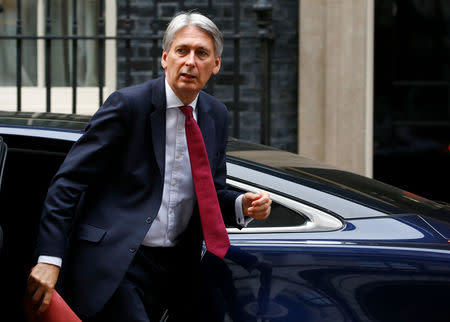Big October deficit puts Hammond's UK budget goal in doubt

By Andy Bruce and Jonathan Cable
LONDON (Reuters) - Britain ran up a much larger budget deficit than expected in October, leaving finance minister Philip Hammond at risk of missing a borrowing target announced last month when he promised voters an easing of austerity.
The deficit in October rose to 8.820 billion pounds from 7.235 billion pounds a year earlier, official data showed, marking the biggest October shortfall for three years.
A Reuters poll of economists had pointed to a reading of 6.15 billion pounds.
While tax receipts continued to grow, government spending increased compared with a year ago, the Office for National Statistics said, citing notable growth in expenditure on goods and services, as well as social benefits.
"October's data paints a difficult picture for (Hammond)," Yael Selfin, chief Economist at accountants KPMG UK, said.
"This increase in the deficit eats into the projected room that (Hammond) saved in case of a damaging Brexit outcome."
Prime Minister Theresa May last week agreed a draft withdrawal deal with Brussels. But it faces stiff resistance in her Conservative Party, meaning it could fail in parliament.
On Tuesday, Bank of England Governor Mark Carney said leaving the European Union with no transition could be akin to the 1970s oil shock for Britain's economy.
The ONS said borrowing for the first seven months of the 2018/19 financial year now stands at 26.7 billion pounds.
While this is down almost 30 percent on the previous year and the lowest at this stage of the financial year since 2005, borrowing already exceeds the Office for Budget Responsibility's forecast of 25.5 billion pounds for the year ending in March.
To meet that, Britain would need to record a budget surplus over the last five months of the financial year -- something that hasn't happened since 2000/01.
In his budget statement on Oct. 29, Hammond announced tax cuts for households and the easing of welfare curbs for poorer working families as well as a big increase in spending on the health services.
But he also warned that an end to the severe spending cuts endured by many government departments since 2010 would depend on Britain securing a Brexit deal with the EU.
Hammond wants to steadily cut national debt as a share of GDP which he says is too high to easily support a big rise in public spending during a future recession.
Public debt, excluding public-owned banks and the Bank of England's stimulus programme, stood at 1.5985 trillion pounds in October, or 75.0 percent of gross domestic product.
That was down from 79.0 percent in the same month of 2017 but still double its level before the financial crisis.
For a graphic on UK budget deficit, see - https://tmsnrt.rs/2PHRacN
(Graphic by Andy Bruce; Editing by Toby Chopra)